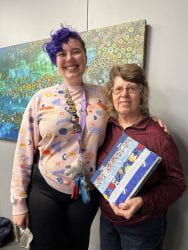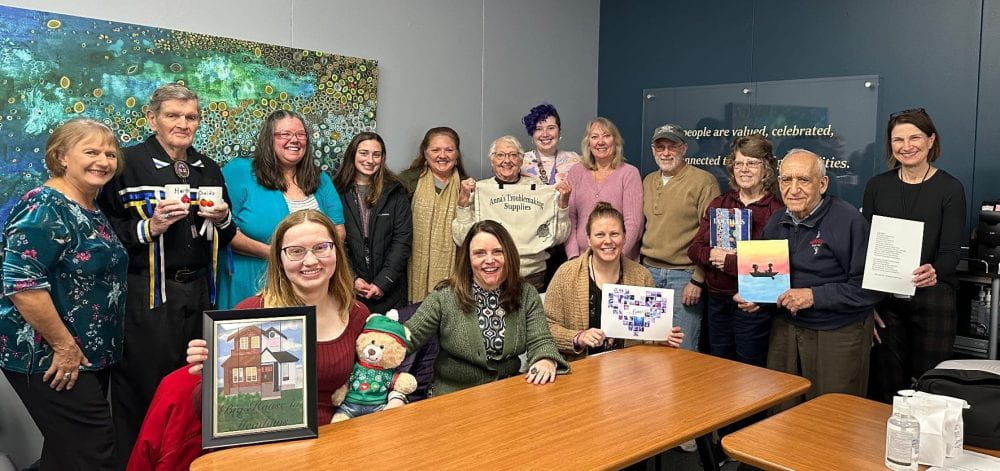The reasons for sharing a story are vast—to make a point, to provide wisdom, to create an emotional connection. For senior citizens, having a forum to share their stories extends beyond communication—to being compassionately cared for, while receiving kindhearted consideration.
This was the premise of a project undertaken last semester by UW-Green Bay Prof. Rebecca Meacham’s English 400 Capstone class, in partnership with the TimeSlips organization and the Aging and Resource Disability Center of Brown County (ADRC). UW-Green Bay is designated as a “Creative Campus” with TimeSlips (a partnership that equips and trains students to use their creative skills outside the classroom to help bring joy and meaning into the lives of elders in their community). For this project, Meacham’s students were instructed, through a series of phone chats with an elder, to ask “Beautiful Questions” that were open and generative.
“TimeSlips method aims to create stories in a way that is safe for people with memory loss,” explains TimeSlips Program Manager Sammy Goodrich. “There is no expectation that participants will share their own life stories, although it can often happen when creativity allows for freedom in one’s thoughts. Our method removes the pressure to remember things, or ‘get things right’ which can be incredibly freeing.”
The UW-Green Bay students spent a lot of time listening, recording, and then developing a semester-ending gift to their assigned elders, based on their many conversations.
The result?
“Measured by the tears of appreciation by the participants (at the end of semester celebration) and the gratitude expressed by the caregivers of the storytellers, it was very impactful,” says Barb Michaels, Prevention Coordinator for the ADRC.
Noted one caregiver, whose spouse participated in the project…
“…For four weeks, two UWGB students spoke to my husband, Ken, via phone, encouraging him to share with them stories of his life. This connection invited him to reflect on the positive events in his lifetime and brought him a respite from the feelings of isolation that dementia can create. The sincere interest that Abby and Grace portrayed, gave Ken feelings of self-worth and dignity… This was a win-win situation, as the students used their creativity to encapsulate their experience in a thoughtful and meaningful expression through art…”
 TimeSlips, with roots in Wisconsin, is an international network of artists and caregivers committed to bringing joy to late life by introducing young people into positive relationships with elders. The anticipated results are meaningful, emotional connections between participants, while infusing creativity into care systems. TimeSlips provided the training and support for the project, but in the past, meetings between interviewees and elders were face-to-face. The pandemic forced a re-examination, prompting all interviews between UW-Green Bay and the ARDC elders to be conducted by phone, rather than in-person.
TimeSlips, with roots in Wisconsin, is an international network of artists and caregivers committed to bringing joy to late life by introducing young people into positive relationships with elders. The anticipated results are meaningful, emotional connections between participants, while infusing creativity into care systems. TimeSlips provided the training and support for the project, but in the past, meetings between interviewees and elders were face-to-face. The pandemic forced a re-examination, prompting all interviews between UW-Green Bay and the ARDC elders to be conducted by phone, rather than in-person.
Timing was perfect, as Prof. Meacham was seeking to find ways to provide her students opportunities for civic engagement that were facilitated remotely.
TimeSlips leaders were pleased with the experiment, and are now replicating campus-based Tele-Stories projects in Detroit and elsewhere.
Still, despite the training, it wasn’t unusual for UW-Green Bay students to enter the project with a bit of consternation. Goodrich said that in the current texting culture, it’s likely that the younger generation is uncomfortable talking on the phone.
“Before the calls with elders began, students were expected to take an online training module from TimeSlips, and then practice the method with a test call with their classmate/project partner, followed by a test call with an elder of whom they already have an established relationship. Students were also asked to write an introduction letter to their assigned elder that would help break the ice,” she said.
UW-Green Bay student Hannah Behling admits to some early-semester nervousness…
“I work at the YMCA in Kimberly (Wis.) as a lifeguard, and I got to interact with many different elders after we reopened (following COVID shutdowns),” she said. “I heard countless stories on how lonely this time was for them and how it was beginning to affect them. I knew this project was focused on loneliness, but I was very worried to go into it. What if I didn’t know enough? What if I wasn’t good at doing something in this capacity? I had talked to and gotten to know many different people, but this project itself felt so different.”
Being able to partner with someone, in this case Travis Peterson eased her concerns a bit.
“We would call every Sunday to prepare for the questions for Cindy and Carla. Still, I remember my heart feeling like it would explode as we waited to call them. When we sat down to call them, the call rang and rang and rang before they finally answered.”
As the semester wore on, Behling’s apprehension would be replaced with confidence in the process and joy in getting to know the elders on a deeper level.
“After we got through the initial getting to know each other, I felt far more comfortable in my ability to hold the conversations and work with these ladies,” she said. “I have never heard of anything like this project before and I think being able to work 2-on-1 with them helped to get to know them on a deeper level than we would have in a group setting. These calls were personal, they had meaning, and they allowed me to get to know everyone so well. The ladies were so fun and every week that we were able to call was exciting, nothing felt stale. By the time the session ended I was sad to know that my time working with the two ladies I worked with was over. We had gotten to know each other on more of a personal level, and while this project was meant to help them, I felt like it helped me in some ways.”
The assignment wouldn’t be fulfilled until the final celebration at the end of the semester, as each student group presented their elders with a gift, created specifically for them based on their stories. The celebration took place on December 16 at ADRC, S. Adams St., Green Bay.
“For Carla we decided to write a one-page short story that accompanied a drawing which was the cover of the story she had been writing, Big House in Meadows. She was not able to be at the meeting for Timeslips, so it ended up being sent to her. For Cindy we wrote a short story that accompanied a Build-A-Bear that she named Baby Bear. We got the idea to give her a bear because we asked her, ‘If love were an object, what would it be?’ and she told us that a teddy bear was what represented love to her. I loved being able to work with her and get to know everything she loved to do.”
Meacham said the final gifts were exceptionally thoughtful and as varied as the elders’ stories and conversations. For example:
*Students painted a sunset silhouette of their assigned elder and his wife on a boat on the river, inspired by one of his favorite memories… when they were first married, and he couldn’t wait to share his family’s vacation cabin with her.
*Sensing how much the history of the Oneida people meant to their assigned elder, students created a 4-set of 12-ounce ceramic mugs with the words “Oneida, Respect, Community and Heritage” painted on them.
*When an elder shared that she was always getting into trouble with her daughter and son-in-law, and she loved to travel, knit, and sew, her assigned students created a sewing supplies bag labeled, “Anna’s Troublemaking Supplies.”
“At UW-Green Bay, part of our mission is to find that intersect between what we do and how it can reach the community,” Meacham said. “I saw TimeSlips and thought, ‘we have to do this!’ What attracted me to TimeSlips was the premise that creativity could be collaborative, supportive, and joyful—and bring elders together with college students. From my work with UntitledTown Book and Author Festival, I saw the power of storytelling firsthand. My work at UWGB is guided by the hope that storytelling can change the world, and this experience showed us all both the power, and comfort, of storytelling.”
In Spring 2024, Meacham will be teaching the English 309 course, Co-Creative Writing, and the full semester will be dedicated to TimeSlips storytelling within the University’s 16-county footprint. “That course was developed, in part, out of the possibilities of co-creative storytelling inspired by TimeSlips,” said Meacham.
Meacham is also hoping the University can engage multicultural faculty and students to consider participating.
Anyone interested in learning more about TimeSlips and the Creative Campus program can visit www.timeslips.org, or contact Program Manager, Andrew Morton at andrew@timeslips.org.


